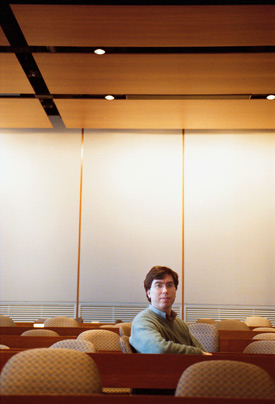Navigating Web’s legal minefields
New Web site gives ‘little guy’ advice on intellectual property questions

In the good old days, intellectual property battles at the OK Corral were fair fights between evenly matched foes. When General William Westmoreland sued CBS for libel in 1982, each side had the financial heft to hire the best lawyers and state its case.
But times have changed, says Jonathan Zittrain, faculty co-director of Harvard Law School’s Berkman Center for Internet & Society and Jack N. and Lillian R. Berkman Assistant Professor of Entrepreneurial Legal Studies at Harvard Law School. On the new landscape of the Wild Wild Web, deep-pocketed corporations are bullying the online equivalent of 90-pound weaklings.
To protect the cyber-weaklings – or at least fortify them with intellectual firepower – the Berkman Center has launched chillingeffects.org, a Web site created by Berkman Center Fellow Wendy Seltzer ’96, HLS ’99, in partnership with the Electronic Frontier Foundation and Harvard, Stanford, Berkeley, and University of San Francisco law school clinics.
“The Internet is putting more people in the way of cease-and-desist letters,” said Seltzer, describing the menacing letters sent by lawyers ordering Web site creators, bulletin board contributors, or music and software swappers to close up shop or risk a defamation or copyright infringement suit. “These letters can be full of legalese and be very threatening to a non-lawyer.”
They can also sometimes be legitimate, says Zittrain. “It’s hard to say whether it’s a problem or the system working,” he says. “How wonderful if the law is so respected and powerful that all it takes is a friendly reminder on two sheets of paper to get somebody to hew to it.”
A growing phenomenon
Zittrain and Seltzer expect, however, that they’ll find more than a few cases where the law is overstepping its legal turf. The phenomenon of sending such cease-and-desist letters is growing; companies akin to collection agencies have been set up for expressly this purpose. Last year, says Zittrain, the Motion Picture Association of America sent between 20,000 and 50,000 of such threats.
The letters’ effect on free speech is chilling, say the site’s creators. “In most instances, [receiving a cease and desist letter] is enough to get somebody to back off,” says Zittrain.
Early indications are that Internet users and producers – whether they’re paying homage to Mr. Spock, mocking kids’ dinosaur Barney or griping about Enron – are thirsty for information about their rights. Launched on Monday, Feb. 25, chillingeffects.org received over a million hits its first week.
The site’s dual goals are to gather and dispense information. Visitors to the site are encouraged to submit cease-and-desist letters they have received; they’re entered into a searchable database and annotated with definitions decoding terms like “trademark dilution” or “unfair competition.”
As information is gathered, the site’s “Weather Report” section will focus on hot issues. A court ruling, says Seltzer, might indicate a sunny day or “a thunderstorm to watch out for,” she says.
Early exposure
While Zittrain, an expert on digital property and speech, has not received a cease-and-desist letter directly, an early experience sensitized him to the issue. As a 14-year-old columnist for Computer Shopper magazine, he wrote that a piece of software was, in his opinion, terrible. The manufacturer of the software threatened to sue him if he didn’t retract his review.
Zittrain’s parents, both lawyers, shot back a threatening letter of their own and they never heard from the manufacturer again. Had he not been the son of lawyers, however, “I might well have buckled,” says Zittrain. “I didn’t want to lose my allowance.”
The Internet’s accessibility exacerbates situations like the one Zittrain faced as a teenager. Anyone with a computer can publish an opinion on the Internet, he says, and many exist free of the vetting to which respected print publications will submit their columnists and reporters. And had Web sites like epinions.com existed when he was 14, Zittrain’s pan of the software might still haunt the manufacturer, long after copies of Computer Shopper hit the recycle bin.
Zittrain and Seltzer hope that chillingeffects.org makes the Internet a safe place for discourse among parties who have a better understanding of their rights. “A well-functioning legal system is one that has no place for bullies,” says Zittrain.




